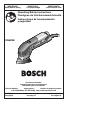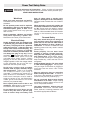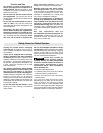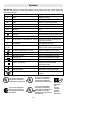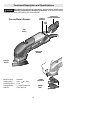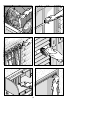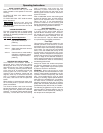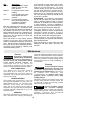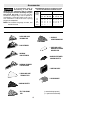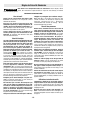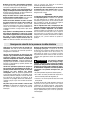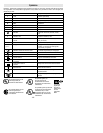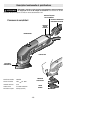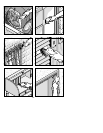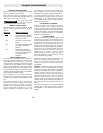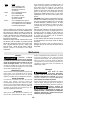
Service
Preventive maintenance
performed by unauthorized
personnel may result in misplacing of
internal wires and components which
could cause serious hazard. We
recommend that all tool service be
performed by a Bosch Factory Service
Center or Authorized Bosch Service Station.
TOOL LUBRICATION
Your Bosch tool has been properly
lubricated and is ready to use. It is
recommended that tools with gears be
regreased with a special gear lubricant at
every brush change.
CARBON BRUSHES
The brushes and commutator in your tool
have been engineered for many hours of
dependable service. To maintain peak
efficiency of the motor, we recommend
every two to six months the brushes be
examined. Only genuine Bosch replacement
brushes specially designed for your tool
should be used.
BEARINGS
After about 300-400 hours of operation, or at
every second brush change, the bearings
should be replaced at Bosch Factory Service
Center or Authorized Bosch Service Station.
Bearings which become noisy (due to heavy
load or very abrasive material cutting) should
be replaced at once to avoid overheating or
motor failure.
Cleaning
To avoid accidents always
disconnect the tool from
the power supply before cleaning or
performing any maintenance. The tool may
be cleaned most effectively with
compressed dry air. Always wear safety
goggles when cleaning tools with
compressed air.
Ventilation openings and switch levers must
be kept clean and free of foreign matter. Do
not attempt to clean by inserting pointed
objects through openings.
Certain cleaning agents
and solvents damage
plastic parts. Some of these are: gasoline,
carbon tetrachloride, chlorinated cleaning
solvents, ammonia and household
detergents that contain ammonia.
Maintenance
!
CAUTION
-8-
Grit Application
Coarse For rough wood or metal
sanding, and rust or old
finish removal.
Medium For general wood or metal
sanding
Fine For final finishing of wood,
metal, plaster and other
surfaces.
Extra fine For final sanding of bare
wood, smoothing old paint,
or preparing a finished
surface for recoating.
With the workpiece firmly secured, turn tool
on as described above. Contact the work
with the tool after the sander has reached its
full speed, and remove it from the work
before switching the tool off. Operating your
sander in this manner will prolong switch
and motor life, and greatly increase the
quality of your work.
Move the sander in long steady strokes
parallel to the grain using some lateral
motion to overlap the strokes by as much as
75%. DO NOT apply excessive pressure -
let the tool do the work. Excessive pressure
will result in poor handling, vibration, and
unwanted sanding marks.
If the surface is rough, begin with coarser
grits and then complete the surfacing with
medium and fine abrasives. To avoid
uneven results, do not skip more than one
grit size when going from coarser to finer,
and do not sand in one area for too long.
When the job is completed, gently lift the
tool from the work surface and slide switch
to the “OFF” position.
POLISHING: Your Bosch corner/detail
sander may be fitted with optional abrasive
mesh or polishing pads to polish or remove
scratches or corrosion from metal, painted,
or other surfaces. The tool is operated in
much the same way as when sanding, but
the following points should be observed;
Use light pressure and a circular or
overlapping motion to remove scratches and
corrosion or polish a surface. If using a
compound, use only as much as necessary
and do not use the dust extraction feature.
When working in very confined areas or
louvered panels, the optional pad extension
plate should be fitted.
Clean the buffing or mesh pads with mild
detergents and warm water. DO NOT use
solvents.
!
WARNING
!
WARNING



